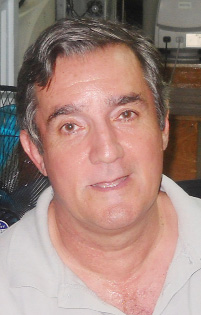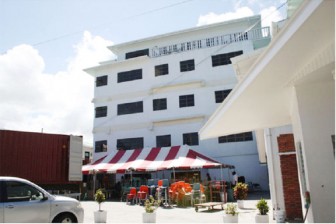Ask local businessmen their opinions on the biggest threats to the growth and development expansion of the private sector in Guyana and many of them are likely to tell you that at least one of those threats is the scarcity of management skills to keep the wheels of industry turning.
Not only have many qualified managers in the private sector continued to seize the first opportunity that presents itself to seek their fortunes abroad, but the chances of finding replacements locally are slim, given the fact the opportunities for University-level training in business-related disciplines even at the undergraduate level are virtually non-existent in Guyana.

Over time, various proposals have been mooted for closer collaboration between the University of Guyana and the private sector aimed at ensuring that the University provides at least some of the skills which are in particular demand in local industry. The most recent of these initiatives, taken less than two years ago, saw the local private sector name a team of officials assigned to work with the University of Guyana towards the setting up of a Business School at the Turkeyen Campus. Despite evidence of enthusiasm on both sides for the creation of such an institution, however, it was always doubtful that, given the multi-faceted difficulties confronting the university, it could, at least in the short term, be part of such an initiative.
Faced with the twin challenges of outward migration among skilled personnel and a dearth of local training facilities, the private sector has, over time, adopted various strategies to ensure some measure of skills retention. One such practice has been to pay their key qualified managers well enough to hopefully persuade them to stay. Another has been to outsource specialized tasks to high-priced consultants, a pursuit that often impacts negatively on their profitability.
Director of the locally-based Nations University, Dr Brian O’Toole, who is also Head of the privately-run School of the Nations believes that the answer to the problem of scarce management skills in the business sector, reposes, at least in part, in creating more opportunities for the acquisition of quality-assured qualifications here in Guyana as has increasingly become the practice in other developing countries. Accordingly, Nations University in collaboration with the Austra-lian Institute of Business Administration (AIBA) will, in August, launch a 12-month Masters in Business Administration (MBA) programme that targets both individuals aim-ed at enhancing their academic credentials as well as local business entities desirous of improving the quality of their management staff. More to the point, perhaps, is the fact that having secured their desired academic goals, most of them then pursue careers at higher remuneration abroad. “We need to provide them with the option of remaining in Guyana,” Dr. O’Toole says.
Currently the most sought after academic qualification in the world, the demand for an MBA degree on the Caribbean, reflects, in large measure, a modest but discernable shift in career choices from the public service to the private sector and self-employment. Last year, the Arthur Lok Jack Graduate School of Business at the University of the West Indies’ St. Augustine Campus launched its own Executive MBA programme as well as other Masters degree programmes here in Guyana.

What Nations University seeks to do, according to Dr O’Toole, is to offer its students more than just another qualification. Its collaboration with the AIBA is a deliberate initiative to offer Guyanese an internationally recognized, quality-assured course of academic studies. Currently, the AIBA has more than 2,000 students located at 17 centres in 12 countries including Trinidad and Tobago, St. Lucia, Jamaica, Malaysia, Singapore, Vietnam and the United Kingdom. The Institute’s MBA’s programme is recognized by the Australian Quality Assurance (AQA) while the institution itself is registered by the Commonwealth Register of Institutions and Courses for Overseas Students. AIBA is also a member of the International Association of Universities. To ensure quality assurance, the AIBA will be responsible for student admissions, approval of lecturers for courses, teaching materials and assessments while a member of the AIBA faculty in Australia will visit Guyana each year.
Not surprisingly, one of Dr O’Toole’s first ports of call has been the private sector. He told Stabroek Business that he has already met with the management of some business houses that have evinced an interest in upgrading the qualifications and skills of their staff. If the skills associated with effective management are just as sorely needed in the public sector as they are in the private sector, it is the business community that has been evincing the greater interest in consolidating that pool of skills. The response, he says, has been encouraging. That apart, individual students have been finding their way to the New Market street campus to enroll for the programme.
Twelve subject areas
Nations University’s MBA programme comprises twelve subject areas – Leadership, Management, Marketing, Legal and Social Issues, Operations Issues, Human Resource Management, Project Management, Entre-preneurship, Performance Management and Succession Planning while the final module is a project. Dr O’Toole believes that the distinct advantage which the new programme offers is that it combines instructions in conventional subject areas associated universally with an MBA with an orientation that seeks to respond specifically to local requirements. Setting aside conventional classroom lecturers, Nations University’s MBA programme will include guest lecturers and discourses by experienced entrepreneurs drawn from various business entities to ensure that the course provides a measure of practical exposure to the issues and challenges associated with the Guyanese business environment. Apart from the basic requirement of a minimum of a Masters degree, each lecturer recruited to the programme will be required to have some measure of practical business experience as well as proven teaching skills.
A critical aspect of the student selection process reposes in the possession of adequate entry requirements to pursue the programme. There are, according to information being circulated by the Nations University, three entry routes to the programme; possession of a recognized Bachelor’s Degree; possession of a recognized Advanced Diploma along with three years of relevant work experience or possession of three years verifiable managerial experience. Nations University’s MBA students will automatically become members of an international Student Forum that allows for consultation with other AIBA students around the world as well as access to the internationally renowned Michigan-based Pro Quest electronic research archive which provides research sources such as newspapers, periodicals, dissertations and a range of data bases.
Dr O’Toole says that affordability is a key consideration for students seeking to pursue the University’s MBA programme. In circumstances where costs associated with the completion of an MBA degree at international universities can range from US$25,000 to $100,000, he points out that in the Guyana context cost is inextricably bound up with access. Accordingly, Nations University says that its total fee of US$5,210 is the cheapest on offer for an MBA programme in Guyana. The other expenses which students are expected to meet will be the purchase of a key text book for each subject priced at between US$30 and US$50. However, the University library will have copies of each of the texts. Nations University says that it is in the process of constructing a purpose-built, air conditioned lecture room for the programme which will include DSL internet facilities and up-to-date audio visual aids.





